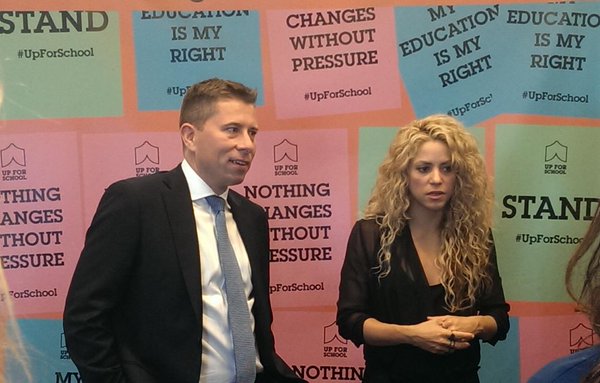- Posted on : October 7, 2015
- Posted by : Tom Fletcher
For a week each September, the global foreign policy elites — elected and often unelected — relocate to New York for the annual jamboree of statecraft, the UN General Assembly.
Despite being hosted in one of the world’s highest energy cities, the UN can feel pretty low-octane. Rooms with not enough air and speeches with too much of it. The bleary eyes of jet-lagged entourages and the perma tans and swagger of the Davosphere. Diplomatic sherpas trailed by their heavily loaded yaks, struggling with tomes of briefing. The rare celebrity President who can turn heads amid the mournful looks of the leaders who don’t. The rogue showboat speech — Gadhafi ripping up the UN Charter, Chavez and the ‘smell of sulphur’ — giving way to monotony as another leader includes a platitude per conflict. ‘Turning now to Ethiopia/Eritrea, we must remain concerned and engaged’.
Away from the podium, it is diplomatic speed-dating: plenaries, pull asides and pool sprays; bilaterals and brush bys; grip and grins. Most are carefully choreographed, but not all. At one UNGA, I organised an ambush of a President who wanted to avoid a difficult meeting with the British Prime Minister. At another, I had to bundle a PM into a side room to avoid an unwanted encounter with Robert Mugabe. Promising careers can be broken by a graveyard speaker slot or uncomfortable placement.
But don’t get me wrong. The UN may not be perfect, and the cast has a tendency to inauthentic hyperbole. But no-one has yet come up with a better idea for global coexistence. Beyond the protocol and preening, the tedium and tantrums, what happens in those corridors really matters to all of us.
This year I’m in New York to hammer away at a single issue — education. There are as many kids out of school globally as people in the UK. They risk becoming a lost generation, vulnerable to radicalisation and manipulation. We want to make it a fairer fight by arming them with knowledge and hope. People talk about countering extremism with boots on the ground, but it also takes books in the hand. You can find out more about the effort to get 1 million Syrian children into school here.
Please join those who are #UpForSchool.
I saw for myself in Lebanon the scale of the refugee challenge, the extent of the education aspiration, and the immensity of the danger should we fail. Without progress, we will discover that the sword is mightier than the pen. Without delivery, we will wake up to more empty life jackets on our shores. Without sustained effort, we will risk probing again the potentially uglier limits of compassion in our own societies.
The vast majority of refugees that I have met want the same things as the rest of us: education for their kids, security, community. The clue is in the name — refuge. You don’t put your toddler in a dinghy on the Med for a nicer TV or a better smartphone. The average Syrian child resettled will deliver more for Europe’s economy than average European. They have had to overcome so much already — they have trained at altitude.
I also learnt something in Lebanon that is perhaps obvious to anyone outside government — governments can’t deliver this effort alone. Especially in a time of limited budgets, energy levels, media cycles and attention spans.
We need to marshall new coalitions — business, government, civil society, the education sector, citizens. The private sector role, where I’m personally focused, demands a new paradigm. In the old model, we asked for money, companies found some in a CSR pot, we praised them, they felt a bit less like soulless corporates, and we all carried on what we were doing. But now we’re not asking just for money (though some would be nice). We’re looking for ingenuity, networks, the ability to make stuff happen. We’re looking for new ideas to tackle the oldest of challenges. In New York next week, we’ll bring together a growing number of businesses who are ready to get stuck in.
Of course, education is only one part of the answer. The toxic Syrian war leaves us all more deeply scarred than we can comprehend. The concept of protection of the most vulnerable lies bleeding beneath the rubble. But Syria must not be RIP R2P. We must double down on courageous and audacious diplomacy, looking to use the opportunity of the Iran deal to deliver a new regional dialogue, resisting harder liners — whether in Tehran, Tel Aviv or the Tea Party - who want to stick to the cosy but corrosive polarisations of the past. We underestimated the brutal lengths Assad and his international backers would go to to stay — literally getting away with murder.
We overestimated international courage, will, compassion, influence, stomach, and patience. But Syria is more than a barrel bombing tyrant and a box office death cult. Can the regional players spend as much time trying to end the conflict as arm it?
In my diplomatic lifetime, the interplay between those inside UN meetings and those outside has been transformed. And we are only beginning to see how digital connectivity will tear through the post 1945 global infrastructure. It is easy to be cynical about the hashtags, the celebrity tweets and the ‘now or never’ cliffhanger campaigns. But I have seen how they force leaders to make tougher decisions. We have subcontracted to the UN many of the biggest challenges facing humanity. But let’s not subcontract — as Stephen Hawking captures with such power — our sense of perspective. Nor our ingenuity, our survival instinct and our conscience.

